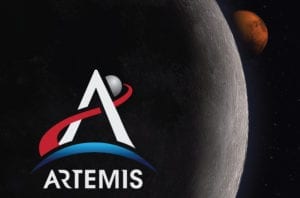
By John B. Sheldon
Following the announcement on 5 May 2020 by NASA administrator Jim Bridenstine of the proposed Artemis Accords, NASA revealed further details on 14 May 2020 that provide some granularity of what is likely being discussed in private channels with like-minded countries.
The new details about the Artemis Accords were posted on the NASA website on 14 May 2020 (and can be seen here).
The Artemis Accords are a set of proposed principles that could provide the legal and diplomatic basis for governance of a human return to the Moon and the possible exploitation of the resources there, as well as civil and commercial activities throughout the Solar System.
The NASA webpage devoted to the Artemis Accords says, “With numerous countries and private sector players conducting missions and operations in cislunar space, it’s critical to establish a common set of principles to govern the civil exploration and use of outer space.”
“International space agencies that join NASA in the Artemis program will do so by executing bilateral Artemis Accords agreements, which will describe a shared vision for principles, grounded in the Outer Space Treaty of 1967, to create a safe and transparent environment which facilitates exploration, science, and commercial activities for all of humanity to enjoy,” the webpage adds.
The remainder of the broad overview of the proposed Artemis Accords covers the following principles and concepts:
Peaceful Purposes
“International cooperation on Artemis is intended not only to bolster space exploration but to enhance peaceful relationships between nations. Therefore, at the core of the Artemis Accords is the requirement that all activities will be conducted for peaceful purposes, per the tenets of the Outer Space Treaty,” the NASA webpage says.
Transparency
According to NASA, “Transparency is a key principle for responsible civil space exploration and NASA has always taken care to publicly describe its policies and plans. Artemis Accords partner nations will be required to uphold this principle by publicly describing their own policies and plans in a transparent manner.”
Interoperability
“Interoperability of systems is critical to ensure safe and robust space exploration. Therefore, the Artemis Accords call for partner nations to utilize open international standards, develop new standards when necessary, and strive to support interoperability to the greatest extent practical,” NASA says.
Emergency Assistance
NASA states that, “Providing emergency assistance to those in needs is a cornerstone of any responsible civil space program. Therefore, the Artemis Accords reaffirm NASA’s and partner nations’ commitments to the Agreement on the Rescue of Astronauts, the Return of Astronauts and the Return of Objects Launched into Outer Space. Additionally, under the Accords, NASA and partner nations commit to taking all reasonable steps possible to render assistance to astronauts in distress.”
Registration of Space Objects
“Registration is at the very core of creating a safe and sustainable environment in space to conduct public and private activities. Without proper registration, coordination to avoid harmful interference cannot take place. The Artemis Accords reinforces the critical nature of registration and urges any partner which isn’t already a member of the Registration Convention to join as soon as possible.”
Release of Scientific Data
Lastly, the NASA webpage says, “NASA has always been committed to the timely, full, and open sharing of scientific data. Artemis Accords partners will agree to follow NASA’s example, releasing their scientific data publicly to ensure that the entire world can benefit from the Artemis journey of exploration and discovery.”
An Artemis Accords document has not yet been released to proposed partner countries or to the public, but it is understood that NASA officials have been verbally briefing their counterparts in other national space agencies about the scope and purpose of the Accords.
It is also understood, however, that an Artemis Accords document from NASA is currently undergoing what is known as the ‘Circular 175 Procedure’ within the US Department of State to ensure that the Accords are in compliance with the US Constitution.
 SpaceWatch.Global An independent perspective on space
SpaceWatch.Global An independent perspective on space




